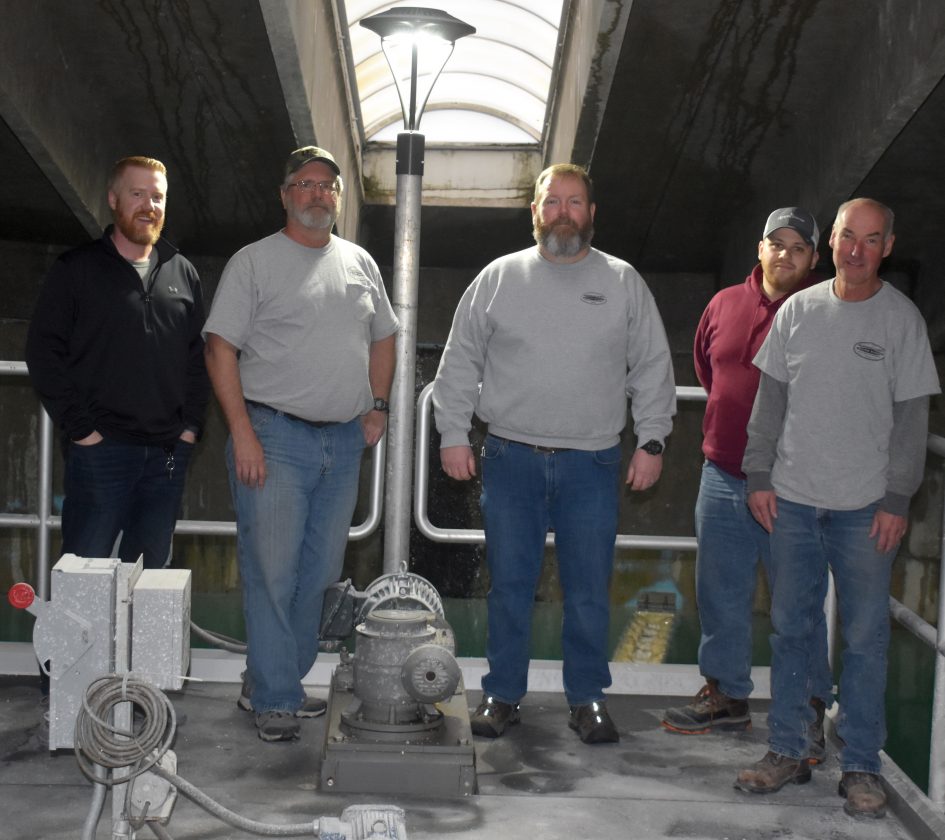Water Works plans $10 million in capital improvements over next five years

T-R PHOTO BY ROBERT MAHARRY From left to right, Marshalltown Water Works employees Connor Hunt, operations manager, Jeff Heinrichs, Ryan McFarland and Dillon Collins, all operators, and Ed Phillips, operator/maintenance. Not pictured are Jon Reuter and Mark Gilarski. Water Works is planning just over $10 million in capital improvements over the next five fiscal years.
Fixing Marshalltown’s aging water infrastructure and equipping it for the future won’t happen overnight, but Marshalltown Water Works (MWW) General Manager Shelli Lovell and her board of directors believe the $10,039,000 in capital improvements they have planned over the next five fiscal years should go a long way toward addressing the issue.
“I would say that Water Works is trying to move forward with a very proactive capital improvement plan,” Lovell said. “I think it’s a relatively aggressive CIP.”
Although MWW is an independent agency, it does coordinate with the city on several projects including water infrastructure upgrades, specifically with the Downtown Implementation Plan (DIP) set to kick into high gear soon. The biggest problem is relatively easy to identify but will take work to rectify: most of the city’s mains are at least a century old.
“We can’t just make things look better on the top. There’s a lot going on down below that needs to be done,” Marshalltown City Administrator Jessica Kinser said.
MWW Board of Directors Chairwoman Laura Eilers said she is excited to see their plans come together and reflected on the results of a report that showed it would take at least $1 million a year just to keep pipes up to date.
“I think that kind of hit us all like ‘Oh, if we’re going to keep up with this at all — the aging infrastructure — we’ve got to make those big projects happen.’ We can’t just keep waiting to see what the city does and do these projects together,” Eilers said. “We really need to be more proactive and look toward replacing more each construction season in order to stay reliable in what we can do to serve Marshalltown.”
Kinser said the coordination between the city and MWW has improved substantially under Lovell’s leadership, and she’s excited to continue the relationship as the State Street overhaul — the first phase of the larger DIP — is set to begin before the end of the year.
“When we do something, it often impacts them and we want to make sure it’s in their plans as well,” Kinser said. “We’ve got a lot of big plans coming up that put expectations on them, so I would say there’s a lot planned and it’s very aggressive.”
Some of the immediate work residents can expect to see, according to Lovell, includes main replacements on South Fifth and Sixth Avenues and South Street, which will cost around $620,000 in all.
“These have probably mostly been held up due to staffing shortages, and now we’re getting pretty bulked up. And we’re hoping to make some significant progress on both of those this year,” she said.
While temporary interruptions in service are never ideal, Lovell is hopeful that in the long term, residents will have fewer main breaks to deal with and the same excellent water quality they’ve come to appreciate.
“People in Marshalltown do really like the taste of the water. They like that it’s not hard water, so we want to maintain those things as close to what they currently are as possible,” she said. “(We want it) so that people don’t have to worry if we’re going to have water. They can continue to count on it when they turn the faucet on.”
In addition to the mains, the plan also budgets for upgrades at the water treatment plant on the north edge of town.
“Some of our wells are getting very old, and you actually lose capacity. Water doesn’t move through the ground as quickly after 50 years through those same pathways as it did before,” Lovell said. “Part of what we’re doing is studying ‘Can we rehabilitate the wells that we have or do we need to replace them?'”
The projects will be financed through a combination of saved money, grants and loans, and the amounts budgeted per fiscal year are as follows: $2,030,000 in FY 2023, $2,250,000 in FY 2024, $1,953,000 in FY 2025, $1,953,000 in FY 2026 and $1,853,000 in FY 2027. Lovell and Kinser believe the investments will accommodate Marshalltown’s plans for growth while also providing the same reliable service as in the past.
“Everybody needs water, and so you don’t have to look very far around the country to see where water has become an issue. So having a supply that is safe is priority number one for not only being able to support your existing population but being able to grow. You just need that resource to grow,” Kinser said. “We can’t do upper story housing if we don’t have a reliable water supply and a system to get water there. It’s the basis of everything for Marshalltown and our future.”
——
Contact Robert Maharry at 641-753-6611 ext. 255 or rmaharry@timesrepublican.com






